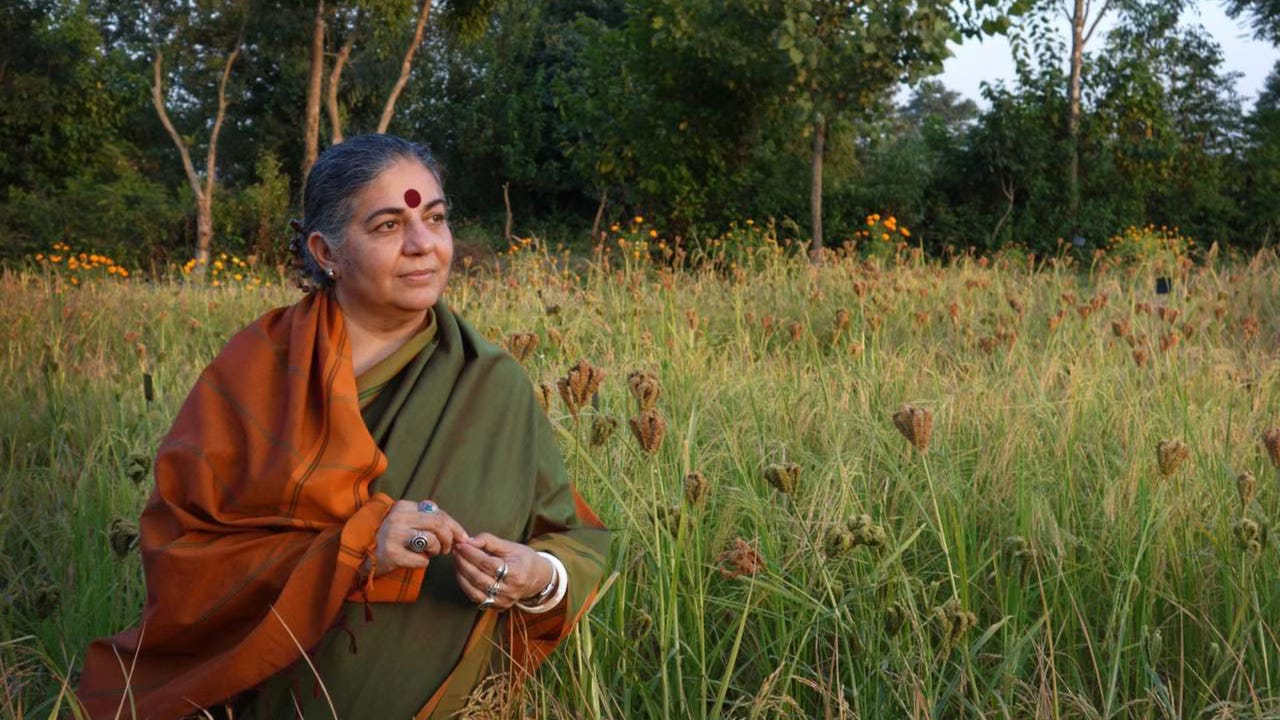Vandana Shiva
Science, Nature, and Resistance
Vandana Shiva is one of the most prominent voices in contemporary ecological thought. A trained theoretical physicist, writer, philosopher, ecofeminist, and environmental activist, Shiva was born in 1952 in the city of Dehradun, India. Throughout her journey, she has stood out for combining academic knowledge with political engagement, always defending the environment, women, and local communities.
Founder of the organization Navdanya, established in 1987, Vandana Shiva has dedicated herself to preserving native seeds and valuing traditional agricultural knowledge. Her work has had a direct impact on the lives of thousands of farmers, encouraging sustainable and organic practices, and proposing alternatives to the dominant agro-industrial model. Her activism expresses a vision of the world that connects ecological justice, social justice, and food sovereignty.
Throughout her writings, Shiva builds a powerful critique of the modern scientific paradigm, which she characterizes as reductionist. According to her, the way dominant science developed—especially after the Scientific Revolution of the 15th to 17th centuries—is rooted in a mechanistic, fragmented, and hierarchical view of the world. This way of seeing and explaining reality, far from being universal, is, in her view, a specific projection of Western, patriarchal man focused on controlling nature.
However, her critique of reductionism goes beyond the epistemological sphere. Shiva shows how this model of science is directly tied to capitalist economic organization and patriarchal power structures. It is a science that excludes other ways of knowing, values only technical knowledge, and separates the expert from what is being studied—disregarding direct experience as a legitimate form of wisdom.
Vandana Shiva deepens this reflection by showing that this logic of exclusion affects both nature and women. The exploitation of nature and the oppression of women are not isolated phenomena but rather expressions of the same system of domination, which treats both the earth and women’s bodies as resources available for control and manipulation. According to her, violence against the Earth and violence against women are deeply intertwined—both symbolically, by shaping worldviews, and materially, by directly impacting women’s daily lives.
In many communities, especially rural ones, it is women who maintain a daily and direct relationship with the environment. They are responsible for activities such as growing food, caring for water sources, selecting and preserving seeds, and passing on knowledge related to the sustainability of life. For this reason, when land is degraded or appropriated, it is also women who suffer the most from the consequences of this destruction.
Shiva shows how this logic of domination also manifests in the fields of science and medicine. The medicalization of childbirth, for example, is for her a clear expression of reductionist epistemology: the female body is treated like a machine, divided into parts and managed by specialists. A woman’s knowledge of her own body and the birthing process is displaced and replaced by medical authority. The doctor—not the woman—becomes the center of birth.
This same logic appears in industrial agriculture. Just as the female body is fragmented and controlled, the seed—symbol of regeneration and continuity of life—is transformed into a technical object. Instead of being born from the earth and shared among peoples, it is manipulated in laboratories, artificially modified, patented, and controlled by large corporations. This process reduces the seed to a product with no natural regenerative capacity, breaking organic cycles and ancestral knowledge.
By drawing this parallel between the female body and the seed, Shiva reveals how the dominant scientific paradigm operates on vital processes with the same logic of control. Both the life that comes from women and the life that sprouts from the earth are subjected to a rationality that seeks to maximize productivity, centralize knowledge, and eliminate autonomy. For her, this model not only excludes other ways of knowing and living but also threatens the sustainability of the planet itself. By interrupting regenerative cycles—whether biological, social, or cultural—it endangers the continuity of life.
But Shiva doesn’t stop at critique. She proposes a concrete alternative: a science that recognizes the complexity, interdependence, and plurality of living systems. A science that values cultural knowledge, local experiences, and community participation. By doing so, she defends a way of knowing that is committed to life, not domination.
Over time, Vandana Shiva has become a leader who inspires communities around the world. Her work bridges critical thought and political action, theory and practice, science and spirituality. In an age marked by ecological crisis, social inequality, and the destruction of cultural knowledge, her voice invites us to imagine other possible paths.
More than a critique of science, Vandana Shiva’s thinking is a call to rebuild a vision of the world. A world where life—in all its forms—is at the center of political, economic, and scientific decisions. A world that abandons the logic of exclusionary progress and sees in women and traditional peoples the vital force to reimagine how we live and coexist.



